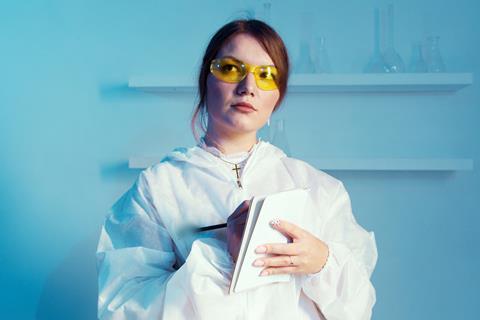Kate Ellis Sawyer grew up fascinated by the world around her and believes studying chemistry can be a blessing to study as a believer

Growing up I was fairly curious about the natural world around me; I was one of those kids who asked my parents a lot of questions. Why is the sky blue? What is that flower, plant or animal called? I also liked dinosaurs, knew many of their long, complicated names (which I have now forgotten) and loved visiting the natural history museum in Oxford where I grew up.
Some of my earliest, specific memoires from school are science projects when I was aged between ten and twelve. The first was looking at growing marigolds in different conditions and measuring which flower grew best. Would the flower grow best in the light or dark? With or without water? In normal soil or wood chip? I knew the answer for the first two options, but I didn’t know if the flower would grow best in normal soil and wood chip, so that was the question I set out to discover.
The second project was a detailed documentation of the plants and wildlife growing around our school. We picked leaves and flowers, dried them out and stuck them in our book. We had a go at drawing the leaves, trees, flowers and birds ourselves. It was fascinating learning their names and really looking at these plants in such detail which had been surrounding us this whole time.
With this small amount of information, you may not be surprised to learn that I went on to study and work in a scientific area later in life. This curiosity (plus a lot of hard work and support from people around me) lead me to study chemistry for my undergraduate degree, followed by a two-year graduate scheme at a pharmaceutical company. Now I am approaching the end of a chemistry PhD. (You can read other articles on studying here).
Why chemistry?
I have heard many reasons put forward for studying chemistry over the years. It is a subject where you can develop various skills. For example, you start developing problem solving from GCSE-level, if not before. You become able to take the information you have been given in class and apply it to new questions. Time management is another key skill that studying chemistry can grow – I learnt fairly quickly during those experiments that managing time well was useful if you wanted to get to break or your next lesson on time! Later on, communication becomes very important in chemistry, from writing lab reports to spoken presentations to presenting posters (yes, strangely we often communicate our science using posters, but I am afraid they are not as pretty as the poster people tend to have on their wall at home).
However, personally the development of new skills does not really draw me to a subject. What drew me to chemistry was the potential for it to be useful to the world. At university my favourite lectures were the medicinal chemistry lectures: the lectures where we learnt how the molecules we make could be used to treat the disease. Other areas of chemistry are the same, I had people in my year at university who were helping develop paints, chemical coatings for car mirrors, ways to detect infections in burn wounds, better chemicals to use in nappies and much, much more.
An unexpected benefit of continuing to study chemistry was the opportunity to live and work in Sweden for two years. During my time there I worked with people from many different European nations and beyond, learning about different people’s cultures and stories. Although the specific experience of living in Sweden is not guaranteed, interacting with people from different countries is fairly common within chemistry. All of the research labs I have been a part of have had people from different countries and with research comes the opportunity to go to conferences all over the world.
Faith and chemistry
The science and faith debate that I was vaguely aware of growing up seemed to suggest that you could either be a logical, modern scientist or an illogical, stuck in the past person of faith. The debate appeared to boil scientists and Christians down to very two-dimensional beings with specific characteristics that had to be obtained for you to be defined as one or the other. Throughout my time in both chemistry and Christianity I have found this two-dimensional rendering of people does not match what I have observed. People are wonderfully complex three-dimensional creatures capable of having all sorts of different characteristics, interests and beliefs.
A scientist or a Christian or both?
For those that consider themselves both scientist and Christian, their science often enhances their faith as they marvel at the complexity and beauty of the universe they are studying, a universe they believe was created by the God they worship. Psalm 19:1 says: “The heavens declare the glory of God.” With this in mind a professor of chemistry called David Vosburg, took the style of the psalms and reimagined what it would be like for chemistry to “declare the glory of God”. You can read his reimagining here.




























